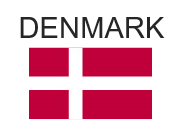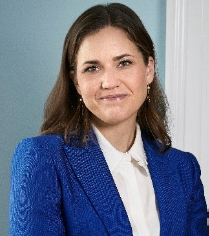The table below aims at gathering the administrative and governmental bodies of Denmark, which are responsible for digital public administration policies and interoperability policies.

National
As a result of the formation of a new government on 15 December 2022, the Ministry of Digital Government and Gender Equality was established. It coordinates the collective efforts to digitise Denmark, while also working towards equality for everyone in all aspects of society. In this context, the Ministry deals with the digitalisation of both the public sector and private businesses to ensure the best possible digital solutions that make it easier to be a Danish citizen or business owner. Furthermore, the Ministry follows the international digitalisation and equality agendas, and acts as the responsible government body for interoperability activities in Denmark.

|
Marie Bjerre
Source: https://english.digmin.dk/ |
As part of the Ministry of Digital Government and Gender Equality, the Agency for Digital Government (formerly known as Agency for Digitisation) is a catalyst for digital development in Denmark. The Agency gathers strategic, professional and technical competencies. One of its main roles is to coordinate public digitalisation, from concept to output. To that end, it facilitates and participates in different initiatives across the entire public sector and coordinates public digitalisation across the different levels of government.
In addition, the Agency acts as secretariat for three steering committees on Digital Infrastructure, Digital Communication, and Technology and Data. Different authorities are represented in the committees with the aim to ensure technical and functional interoperability as well as coherence within public sector digitalisation., and which are therefore responsible for the public sector digital infrastructure.
|
Tanja Franck Director-General of the Danish Agency for Digital Government
Source: https://en.digst.dk/ |
The Ministry of Finance provides the framework for good and efficient governance throughout the Danish government, including the use of digital means for providing public services. For more than a decade the vision has been that the public sector should improve procedures and methods to deliver public services of the best possible quality using digital solutions and modern technology, where possible. To this end, the Ministry of Finance develops and implements initiatives concerning public finance and digital administration, as well as public leadership to improve the efficiency and effectiveness of the public administration.
|
Nicolai Wammen Minister of Finance
Source: http://en.fm.dk/ |
As part of the Ministry of Finance, the Agency for Public Finance and Management supports the Danish government in good and efficient governance. It offers advice and guidance on large-scale ICT projects and management of systems portfolios to Ministries and national agencies as well as State-funded self-governing institutions. In this context, the Agency is responsible for the development and maintenance of the national model for ICT projects and the national model for ICT systems portfolio management, both of which are stipulated by the common budgetary framework for the Danish government.
Also part of the Ministry of Finance, the Agency for Governmental IT Services (Statens It) is a shared service centre for the national government providing ICT services to the majority of Denmark’s Ministries and national agencies. The Agency for Governmental IT Services aims to provide accessibility, stability, effectiveness and information security with a focus on delivering (i) a common central government platform for ICT usage; (ii) standardisation of generic administrative systems; and (iii) effective outsourcing of operational contracts through standard framework procurements.
|
Michael Ørnø Director-General of the Agency for Governmental IT Services
Source: http://www.statens-it.dk/english
|
In 2011, the Danish government established the National ICT Council to optimise and professionalise the management of the Danish government’s ICT projects and systems. The ICT Council comprises 13 senior managers, primarily from the private sector, but also from semipublic and public IT-intensive organisations. All members have great experience with largescale ICT projects or change management, and offer solid and competent guidance to Ministries and national agencies on the management of their projects and systems portfolios. The National ICT Council is supported by the Agency for Public Finance and Management.
The Ministry of Industry, Business and Financial Affairs is responsible for the digital aspects of a number of policy areas which are important for the general business environment, including business regulation, intellectual property rights, competition and consumer policy, finance and shipping. The Ministry works to promote digitalisation within the business environment and in relation to public services for businesses in coordination with the Ministry of Digital Government and Gender Equality.
The Danish Business Authority, an agency under the Ministry, focusses on smart regulation, free movement and the Digital Agenda for Europe to reduce regulatory burdens and enhance growth in the EU. In particular, the Digital Agenda for Europe aims to promote a coherent digital economy in Europe.

|
Morten Bødskov Minister for Industry, Business, and Financial Affairs
Source: https://eng.em.dk/ |
The Ministry of Climate, Energy and Utilities is also responsible for the telecommunication policy, including roaming, competition regulation, and mobile and broadband penetration.
In early 2019, the government created a Data Ethics Council to facilitate public debate about e.g. the use of technology, data and AI in both the public and private sectors. With the aim to reap the many advantages offered by the use of data, the Data Ethics Council seeks to support ethical considerations in the development and use of technology, e.g. citizens’ fundamental rights, legal certainty and fundamental values of society. The Council is composed of members from universities, trade unions and think tanks as well as representatives from the public and private sectors.
In Denmark, the Data Distributor acts as a data hub for basic data and base registries. The Agency for Data Supply and Efficiency is the authority in charge of the Data Distributor. However, a wide range of authorities collect and distribute basic data from different sources, which entails that many different authorities provide data to the Data Distributor. These include, but are not limited to, the Agency for Data Supply and Efficiency, the Danish Geodata Agency, the Danish Business Authority, the Social Security Office, the Danish Agency for Digital Government and the Tax Authority.
In Denmark, the Data Distributor acts as a data hub for basic data and base registries. The Agency for Data Supply and Efficiency is the authority in charge of the Data Distributor. However, a wide range of authorities collects and distributes basic data from different sources and therefore there are many different authorities providing data to the Data Distributor. These include, but are not limited to, the Agency for Data Supply and Efficiency, the Danish Geodata Agency, the Danish Business Authority, the Social Security Office, the Danish Agency for Digitisation and the Tax Authority.
The National Audit Office of Denmark is a public institution whose primary task is to audit the State accounts and to examine whether State funds are administered in accordance with the decisions of the Parliament. The Office carries out both financial and performance audit in accordance with the principles of ‘good public auditing practice’.
The Danish Data Protection Agency exercises surveillance over the processing of data to which the Act on the Processing of Personal Data applies. It mainly deals with specific cases based on inquiries from public authorities or private individuals or takes up cases on its own. The Danish Data Protection Agency is also responsible for supervising data protection practices in the two subnational levels of governance in Denmark.
Local Government Denmark is the national association of local authorities (municipalities) represented in the Steering Committee for Joint Government Cooperation (STS) to report relevant information from the central government to the local authorities. Its mission is to safeguard the common interests of local governments, assist municipalities with consultancy services and ensure that local governments are provided with relevant up-to-date information.
Danish Regions is the national association of regional councils. It is represented in the STS alongside Local Government Denmark. Danish Regions represents the five regions negotiating with the central government and ensures that regional authorities are provided with relevant upto-date information.
Municipalities and regions are responsible for the vast majority of community-centred service delivery and thus play a central role in the public sector. The annual budget agreements between the central government and the organisations representing subnational government, i.e. Local Government Denmark and Danish Regions, are crucial for the government’s cooperation with municipalities and regions.
The 98 municipalities are responsible for carrying out most tasks related to citizen service delivery, including social services, childcare, elderly care, healthcare, employment, culture, environment and planning. The five regions are mainly responsible for the health sector, e.g. hospitals. Municipal and regional bodies implement the individual action plans previously articulated at cross-governmental and departmental level and by domain area, in compliance with the overall national eGovernment Strategy.
In Denmark, one of the overall objectives of digitalisation is to facilitate cooperation between the three levels of government. Thus, Local Government Denmark and Danish Regions are also involved in several of the nationally operated interoperability coordination initiatives, e.g. all the steering committees created as a part of the Digital Strategy and the Digitisation Pact. The Committee for Architecture and Standards, whose aim is to facilitate digital coherence in the public sector at several levels, usually deals with questions and issues related to interoperability (for more information on the IT architecture, read here).
Since April 2017, Ankestyrelsen, a Danish agency, has been responsible for auditing the two subnational levels of governance in Denmark.

